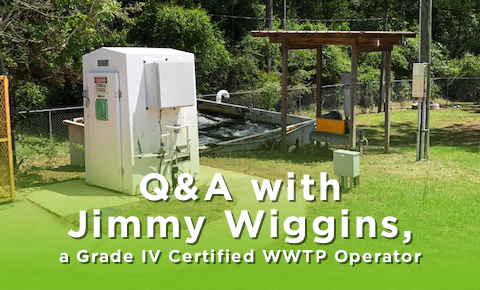How a Certified Wastewater Treatment Plant Operator Can Get Your Facility Back on Track
April 21, 2020

Some wastewater treatment facilities operate with an in-house facility management staff, but many other facilities do not have the resources to employ an experienced team to operate their wastewater treatment system. In these situations, it can be beneficial to consult with an environmental engineering firm with a certified wastewater treatment plant (WWTP) operator to develop optimized processes and recommendations to achieve regulatory compliance.
McFadden Engineering’s certified Grade IV Wastewater Treatment Plant Operator, Jimmy Wiggins, discusses the firm’s consultation process and benefits:
Q: What kind of wastewater treatment facilities often need assistance from a certified WWTP operator?
A: We do a lot of work with smaller and rural municipalities, water boards and other organizations that might have a facilities team, but not a dedicated wastewater treatment plant operator. Many times our clients employ an operator who doesn’t have much experience and works alone or with a very small team. We have worked with organizations of all sizes and operators of varying experience levels.
Q: When is the right time to reach out to a consulting engineering firm?
A: A process upset in the plant that cannot be resolved in house with routine corrective actions; a process is being altered or upgraded; compliance issues; applying for new discharge permits; new process equipment is being purchased and installed – each of these is a situation in which an experienced engineering firm can provide guidance. Sometimes all it takes is a sit-down discussion to answer questions, but other times an engineering firm can develop drawings, communicate with vendors, review equipment submittals and more to assist the in-house operator.
Q: What would be the first steps you would recommend to a non-compliant WWTP to help them recover?
A: The first step is to reach out to an environmental engineering firm with a certified WWTP Operator to perform a site assessment. A firm like this can make recommendations to help the plant reach recovery, which could range from mechanical and process control issues to laboratory procedures. A list of priorities can be developed to determine what issues to tackle first. Usually it starts by getting a handle on biological and lab data, then focusing on the mechanical components of the process. Additionally, recovery could include additional training for the facility’s operator and staff. It’s important to understand that when dealing with biological processes it can take time to make adjustments and corrections in order to see results.
Q: As an operator, what do you look for when initially assessing a treatment system?
A: As an operator, the first thing I want to evaluate is the lab data. This will give us a pretty good idea of how the plant is processing the wastewater. This includes monthly reporting to agencies and daily lab data if available. In addition, maintenance logs and equipment history are usually very helpful in evaluating issues. It’s important to observe the appearance and odor of the wastewater in all the processes. I also try to take a few hours with the senior operator on-site to walk through the entire process and ask questions.
Q: How important is an operation and maintenance program to the overall performance of a wastewater treatment facility?
A: Without a detailed and working maintenance program to guide the operator daily by outlining the mechanical needs within the plant, the operator could be set up for failure. All WWTP equipment should be maintained on a routine basis to add life and functionality. There are multiple free and low-cost software that can track these needs. It can be time consuming up front, but in the long run an ongoing maintenance program will allow the operator to have a better handle on equipment status, the treatment process, and avoiding issues later.
Q: What are some simple things owners can do to extend the life of mechanical equipment at a treatment plant?
A: Establish a user-friendly maintenance program using the equipment manufacturer recommendations. We recommend assigning one operator to take ownership and verify all maintenance is performed correctly, on time and that a record is kept of the activities. Routine maintenance is key, as is paying attention to the simple things – greasing bearings, checking belt tensions, changing oil and maintaining oil levels, etc. All these things can extend the life of equipment. Good housekeeping and keeping the facility clean and organized is just as important, too.
Q: What are some safety guidelines for treatment plants?
A: WWTPs can be dangerous if operators and staff are not trained properly. First, chemical training is important, as hazardous materials like chlorine and sulfur dioxide are commonly used and should be handled properly. Otherwise, it’s important to follow common sense. For instance, I always ask a new operator if they can swim. Additionally, any body of water should have a fence or barrier to prevent falls and life rings to prevent drowning. I also recommend operators employ the “buddy system” when possible. Always use the three-point rule when climbing stairs and ladders, and only allow certified personnel to work on electrical components. I also recommend that full safety training be performed by a certified trainer to all operators and staff. All training should be documented.
Q: What does McFadden Engineering offer when it comes to consulting on WWTP operations?
A: Our team of wastewater treatment experts have more than 100 years of combined experience and have been exposed to many issues and problems that individual facility operators likely have not encountered. We’re here to help operators as an ally – to solve unique problems and provide training to give them the comfort level to work confidently within their facility. We take pride in both problem solving and building operator confidence through training and expert guidance.
For more information about McFadden Engineering’s Facility Management and Operations services, click here or contact our team.